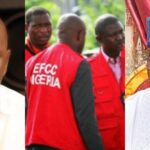UCLA clashes: Police criticized for ‘delayed’ response to violence
The response to violence on the University of California, Los Angeles (UCLA) campus by the office of California’s governor has been criticized.
A group supporting Israel, wearing masks, attacked a Palestinian student camp before campus officers intervened. Governor Gavin Newsom’s representative called the police intervention “unacceptable,” citing its limited and delayed nature.
Hundreds of police officers monitored the campus and its surroundings on Wednesday.
State and university officials stated they promptly deployed security personnel to the tent camp on Dickson Plaza when clashes erupted shortly before midnight on Tuesday.
However, witnesses claimed law enforcement’s response was too slow, with the Daily Bruin editorial board stating there was no mediation late into the night. UC Divest at LA, a group involved in the encampment, accused law enforcement of not responding adequately.
Protesters began dispersing roughly two hours after the attack, with police gaining control by Wednesday morning. Governor Newsom condemned the violence, emphasizing that free speech doesn’t include inciting violence or lawlessness.
He called for those responsible to be held accountable through criminal prosecution, suspension, or expulsion.
Reports from law enforcement sources indicated that only a few UCLA police officers were present and retreated due to being outnumbered. Additional forces from the California Highway Patrol and Los Angeles were called, taking three hours to regain control.
The crash occurred shortly after police in New York cleared a Columbia University building occupied by students.
Protests at Columbia against the war in Gaza have inspired similar actions at universities – small and large, public and private – in more than two dozen states, with activists demanding that institutions cut financial ties with Israel and companies profiting from the war.
UCLA canceled classes on Wednesday, as it sought to ease the tensions bubbling over in the central quad of its Westwood campus.
The university had declared the pro-Palestinian encampment, in the shadow of its famed Royce Hall, an illegal gathering on Tuesday.
Pro-Israeli groups have held counter-demonstrations around the encampment in recent days, with the groups separated by a narrow buffer zone of barricades.
Officials said they had expanded security presence in the area, but declined to disrupt what they acknowledged as “largely peaceful” demonstrations.
Footage online shows that, as midnight approached on Tuesday, a large pro-Israeli group donning black outfits and white masks arrived on campus and attempted to dismantle the barriers.
Fireworks and tear gas flew through the night sky as the masked counter-protesters struck campers with sticks and bats, sprayed them with mace and bear spray, and tore down their signs and boards.
Campers, some wearing goggles and helmets, and others carrying placards and umbrellas rallied to defend their makeshift space.
“Tonight they escalated to a whole new level, they started inciting violence,” one pro-Palestinian student activist told the BBC.
She said her group had faced “relentless” aggression over several days.
Kaia Shah, a UCLA researcher, and pro-Palestinian student, told Reuters one friend “has a massive bump on the back of his head, he just got whacked when he was up here”.
“I just didn’t think they would ever get to this, escalate to this level, where our protest is met by counter-protesters who are violently hurting us, inflicting pain on us when we are not doing anything to them.”
Dylan Winward, a Daily Bruin reporter, said the counter-demonstrators threw objects including “fireworks, a scooter, water bottles, and tear gas”.
He said a university-appointed security team had withdrawn ahead of the clash as it believed it could no longer “safely hold” the buffer zone.
The Bruin also revealed on social media that four of its reporters had been assaulted and sprayed with an irritant early on Wednesday morning by attackers who recorded the incident on their mobile phones.
Mary Osako, a UCLA vice-chancellor, said police and other first responders were called to the scene of its encampment over “horrific acts of violence” early on Wednesday morning.
“We are sickened by this senseless violence and it must end,” she said.
Los Angeles Mayor Karen Bass slammed the clashes as “absolutely abhorrent and inexcusable”.
As night turned to day, a tight security cordon had cleared out the area, as a handful of protesters fortified their encampment.
It remains unclear how many of the people involved in the night-time chaos, particularly on the pro-Israeli side, are students at the university.
The Los Angeles chapter of the Council on American-Islamic Relations blamed the violence on a “mob of pro-Israel extremists”.
It said UCLA needed to ensure “students can continue to peacefully protest the genocide in Gaza without facing attacks”.
Jewish Federation Los Angeles meanwhile blamed the university’s chancellor for allowing “an environment to be created over many months that has made students feel unsafe”.
The group demanded that the encampment be cleared and that UCLA meet leaders of the Jewish community.
UCLA student Eli Tsives, 19, argued the mob did not consist of his fellow students and condemned their actions.
But he told the BBC he welcomes the resulting police presence and has been urging authorities to arrest the campers and investigate antisemitic attacks on campus.
“This is no longer about freedom of speech,” he said. “They are breaking the law.”
Pressure has been mounting on college leaders to rein in pro-Palestinian protests as they spread across the country.
Earlier on Wednesday, New York City Mayor Eric Adams said several out of some 300 arrests at New York campuses had been “outside agitators”.



